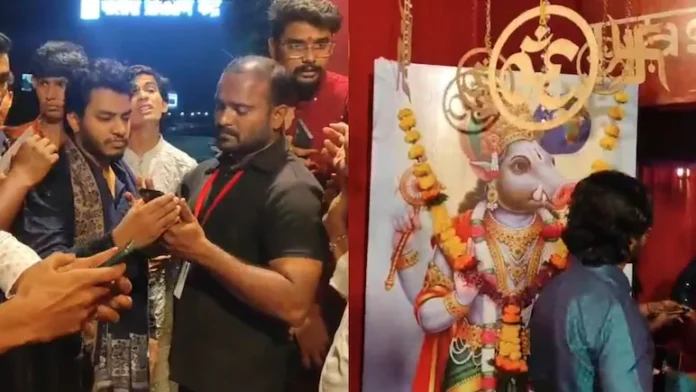Navratri Garba celebrations in Nagpur this year are taking place under a new set of stringent restrictions. Following directives from the Vishwa Hindu Parishad (VHP), organisers have introduced rules that mandate Aadhaar verification, tilak application, and bowing before the Varaha avatar of Lord Vishnu before gaining entry into Garba pandals. The measures, VHP leaders say, are aimed at ensuring that only Hindus take part in the traditional festival, but the move has sparked a political storm.
According to organisers, Aadhaar checks at entry points have been made compulsory to “verify identity” and confirm Hindu participation. Security has also been tightened, with male and female bouncers, private guards, and volunteers deployed to maintain order. The symbolic requirement of bowing before a framed image of Lord Vishnu’s Varaha incarnation, along with the application of a tilak on the forehead, has been added as a form of faith affirmation before participants are allowed into the pandals.
Last week, VHP’s Vidarbha general secretary Prashant Titre went further, suggesting that Garba attendees must also tie a sacred thread (raksha sutra), offer prayers to a Hindu deity, and be sprinkled with ‘gau mutra’ (cow urine) before entry. While not all pandals have implemented every recommendation, VHP and Bajrang Dal workers are present at venues to ensure that key guidelines are enforced during the nine-day festival that began on Sunday and will conclude on October 1.
The VHP has defended the restrictions, claiming they are necessary to prevent instances of “love jihad” – a controversial term used by right-wing groups to allege that Muslim men attempt to lure Hindu women under the guise of relationships with the intention of religious conversion. Leaders argue that similar rules have been considered in other parts of Maharashtra and Gujarat during past Navratri celebrations, and that they are aimed at preserving the cultural and religious sanctity of Garba nights.
The directives, however, have triggered sharp political reactions. Opposition parties have accused the VHP and its affiliates of imposing divisive diktats that threaten the inclusive and celebratory nature of Navratri. Critics argue that such moves attempt to turn a traditional community festival into a tool of exclusion and religious segregation.
Responding to the controversy, Maharashtra minister and senior BJP leader Chandrashekhar Bawankule stated that individual Garba organisers are free to decide their own rules. “Every organiser sets certain rules for their events, and they have a right to do so,” he said, suggesting that the government would not intervene in how private celebrations are conducted.
For many Garba-goers in Nagpur, the new rules have meant longer queues at entry points and stricter monitoring inside pandals. Organisers insist the restrictions are about discipline and faith, but for critics, they represent a worrying shift in how cultural festivals are being regulated under the influence of religious directives.



